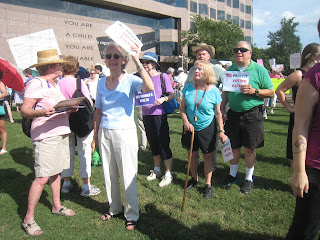A huge personal breakthrough in my own understanding of what this Harrowing of Hell mythology really is all about occurred quite unexpectedly in the midst of a discussion I had with a student a few years ago. A tenderhearted soul, she had seen the movie Cold Mountain the night before and had been severely disturbed by the human atrocities portrayed there. After lying awake all that night, she arrived in class in a very distressed state and asked, "How could this darkness exist? How can we remove this darkness from the planet?"
"Don't you see," I heard myself saying in response, "that by judging it you only make it worse? By trying to stop the black---to make it all white, all good; by saying that this we can accept and this we must reject, you keep empowering that cycle of polarization that creates the problem in the first place?" And I think this has always been the fatal trap in the "God is light" roadmap, the orientation that cleaves to the light by trying to deny or reject the shadow. It only winds up empowering the shadow and deepening it. The resolution doesn't lie in collapsing the tension of opposites by canceling one of them out. Something has to go deeper, something that can hold them both.
For most of my life I have been involved in the struggle for justice for those on the margins of society---people of color, the poor, death row inmates, people living with HIV/AIDS, members of the LGBT community. Underlying my passion for social justice there has always been a sense of outrage at how those on the margins are treated. I've been like Bourgeault's student, distressed, and at times have lain awake at night wrestling with the black.
On July 8 I was arrested while participating in an act of civil disobedience in protest against recent actions by the North Carolina General Assembly and our Governor. A couple of weeks or so later I began to feel overwhelmed---troubled by the negative energy flowing from both ends of the political spectrum, by the vitriolic rhetoric, by the militaristic images, by the us-vs-them mentality. I had to back away. I never questioned the rightness of my actions or the goals of the movement of which I am a part, but I did feel isolated, alone, a stranger even among people of a like mind. I felt sadness.
The District Attorney who is prosecuting those of us who were arrested on the day I was, and on several Mondays preceding and following July 8 (there are over 900 of us), is offering a deal...do 25 hours of community service and pay court costs after which the charges will be dropped. If we refuse the deal we go to trial. I have until November 7 to decide. Since learning of the offer I have been trying to decide which choice was right for me. On a deeper level I have searched for the way to go about deciding which choice was right for me.
Today I see my outrage at social injustice as more of the energy Bourgeault talks about, as empowering that cycle of polarization, of rejecting the dark, trying to deny it or push it away...overcome it. The Wisdom tradition teaches, on the other hand, that love holds both the dark and the light in its hands simultaneously...embraces both. Furthermore, it seems to me, sadness is an expression of love.
I think I'll take the deal. As I type this it feels right. It feels like my way of not trying to collapse the tensions of opposites but rather holding them both. That's the path I see ahead of me now. That could change. The path we see today isn't always the path we'll walk tomorrow.
At the close of worship services this morning we sang a hymn the first verse of which contains the phrase "grant us wisdom." I should say my fellow parishioners sang the hymn because when we came to those words my voice went away and my tears, good tears, came.
Was my experience this morning a recognition event, an experience of Wisdom? I hope so. Do I understand it all? No. Does it raise other questions? Absolutely. For now I'll live those questions...they are questions that go way beyond November 7.
"Grant us Wisdom"...please.
Elm City, NC
September 22, 2013









